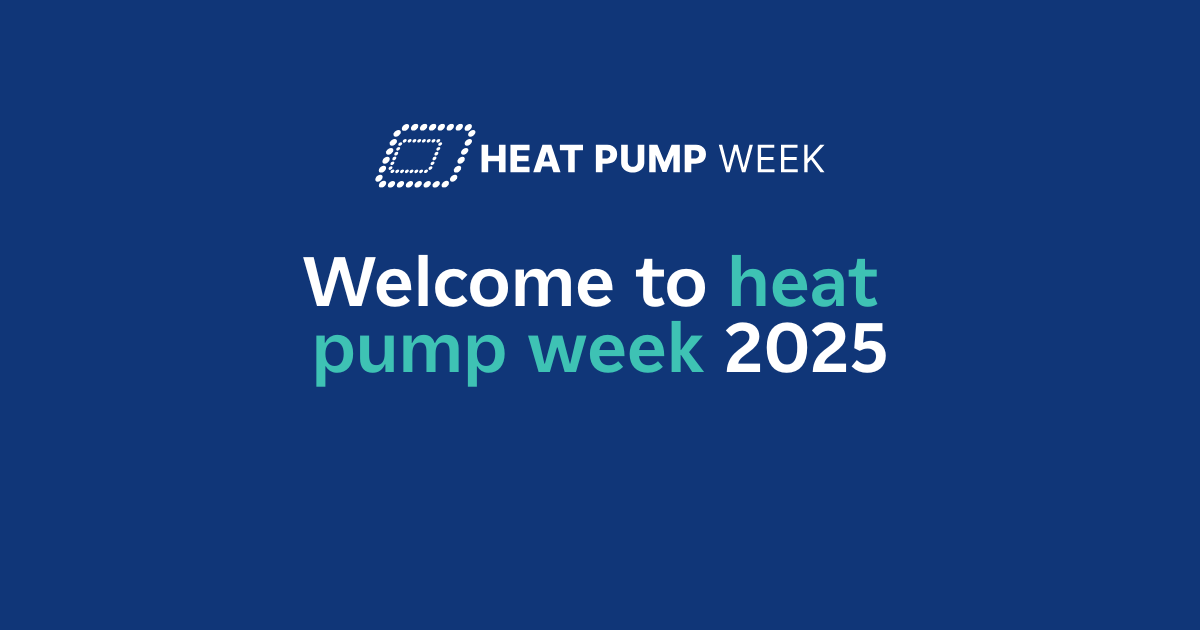Welcome to Heat Pump Week 2025!
The wonderful world of heat pumps
As we dive into the world of heat pumps, get ready to discover how these highly efficient home heating systems can transform your home. With rising energy costs and a growing emphasis on sustainable living, now is the perfect time to explore this innovative technology. Whether you’re curious about the benefits of heat pumps, how they work, or the cost and installation process, we’ve the information right here. So, let’s get started and see why heat pumps might just be one of the best home investments you can make.
As part of the week-long campaign, we’ll explore different types of heat pumps and their unique advantages, as well as offer practical insights into their installation and maintenance. We’ll also address some of the common misconceptions about heat pumps. Whether you’re looking to replace an existing gas boiler or simply interested in sustainable technology, Heat Pump Week will give you some valuable insight into the world of heat pumps.
How does a heat pump work?
Heat pumps are home heating systems that keep your home and hot water hot by transferring heat from the outside air into your home to heat your radiators and hot water.
Air source heat pumps offer a more sustainable way to keep your home warm compared to traditional heating systems such as gas or oil boilers. The technology helps us reduce our reliance on fossil fuels and reduce our carbon emissions. As a result, they play a crucial role in efforts to combat climate change and promote energy independence.

The different types of heat pump
- Air Source Heat Pumps: These are one of the most common types of heat pump and work by extracting heat from the outside air. Even when it’s cold outside, there’s still some heat in the air, and air source heat pumps capture that to heat your home. They are easier to install than other heat pumps and are perfect for the UK climate, making them a popular choice for homeowners.
- Ground Source (or Geothermal) Heat Pumps: These systems draw heat from the ground, which maintains a consistent temperature year-round. However, they require more extensive installation work, including underground piping, which can add to the initial cost.
- Water Source Heat Pumps: These are less common and typically used when there’s a nearby water source, such as a lake or pond, to draw heat from. They can be an excellent option for properties with access to large bodies of water. Despite their efficiency, the feasibility of installing these systems depends largely on the location and availability of suitable water sources.
Heat pump benefits
Heat pumps offer a range of benefits that make them a smart choice for homeowners looking to make reductions on energy bills and reduce their carbon footprint.
- Energy Efficiency: One of the biggest advantages of heat pumps is their energy efficiency. They are 300% more efficient than traditional systems such as gas boilers. When coupled with other energy saving measures such as solar panels and batteries, even more savings can be made.
- Environmentally Friendly: By using renewable heat sources from the air, water, or ground, heat pumps significantly reduce greenhouse gas emissions. This reduction in emissions helps to mitigate climate change and supports global efforts to transition to cleaner energy solutions.
- Low Maintenance: Heat pumps are known for their durability and low maintenance requirements. With regular checks, they can last up to 20 years which is much longer than a traditional boiler! This longevity, combined with minimal upkeep, makes them a cost-effective solution in the long run.
Heat pump costs
The cost of a heat pump system will vary based on the size of your home and the type of system you require. On average, you can expect to spend between £6,000 and £13,000 on your heat pump installation. Before your installation proceeds, your installer will look at the following to prepare your quote:
- The heat loss in your home and how well insulated it is
- You and your family’s heating and hot water requirements
- The current radiators in your home and if any need upgrading
- The space you have available for the external unit and water cylinder
While the initial investment might seem daunting, it’s important to remember that there are also schemes available to help with the costs. The Government’s Boiler Upgrade Scheme for example offers eligible homeowners a grant of £7,500 towards the cost.
Here at EDF Heat Pumps we also offer eligible customers the opportunity to finance their heat pump via manageable monthly payments from under £60 per month (at 9.9% APR) and £182 per month (at 0% APR).
(For full credit terms and conditions please visit www.cbheating.co.uk/heat-pump-cost)
Finance available at a fixed 0% or 9.9% APR representative, subject to status and credit check. The amount to be financed will vary depending on the heat pump required for your property and your chosen deposit.)
Now we’ve covered the initial installation cost of a heat pump, what about running costs? With the rising costs of energy and with electricity costing more than gas, it would be easy to think that there would be little to no running cost savings to be made. However, many heat pump owners find that the system pays for itself over time and delivers savings when they sign up to a dedicated heat pump tariff like the ones offered by our colleagues at EDF.
Additionally, investing in a heat pump can increase your property’s appeal to environmentally-conscious buyers, potentially increasing the value of your home. In the long run, the combination of savings, environmental benefits, and increased home value make heat pumps a sound financial decision.

Let’s talk heat pump installation
Installing your heat pump is where we come in. Here’s how you can expect the process to go:
- Consultation and assessment:We will evaluate your home to determine the best type and size of heat pump for your needs. This assessment includes analysing your current heating and hot water systems, heat loss, insulation levels, and the property’s layout to ensure optimal efficiency and performance. Once all this has been done, we will prepare a quote for you. When you accept the quote, your project goes to our design phase where we will design the exact system you need for your home including optimum running temperatures and where the external unit and internal water cylinder will go.
- Installation process:Depending on the system we’ve designed for you, installation can take anywhere from a 3 – 5 days. We may need to change some or all of your radiators and this will all be in the design document your installer follows. The process involves setting up indoor and outdoor units, running necessary electrical connections, and ensuring all components are properly integrated.
- Testing and commissioning:After installation, the system will be tested to ensure it’s working correctly. The installer will also show you how to operate the controls and understand your new home heating set up. Your installer will also cover basic troubleshooting, setting/changing temperature controls, and understanding how the system works, empowering you to get the most out of your new system.

Maintenance and servicing
To keep your heat pump running efficiently, regular maintenance and servicing is crucial. Here are a few tips:
- Regularly clean filters:Dirty filters can restrict airflow and reduce efficiency. Check them monthly and clean or replace as needed. Clean filters ensure that your system operates at peak efficiency, preventing unnecessary strain on the components and prolonging the system’s lifespan.
- Clear outdoor units:Make sure the outdoor unit is free of debris, leaves, and snow to maintain good airflow. Regularly inspect the outdoor unit and trim any nearby plants or shrubs that could obstruct airflow. Keeping the area clear will help prevent overheating and maintain optimal performance.
- Annual servicing:We recommend having a professional service on your heat pump at least once a year to ensure everything is in good working order. This is no different to having your boiler serviced annually. Annual servicing will identify potential issues before they become major problems, saving you money on costly repairs. During these visits, your engineer can also optimise system settings for maximum efficiency.
Heat pumps are a fantastic option for those looking to enhance their home’s energy efficiency while staying comfortable year-round. With benefits like reduced energy bills and a lower environmental impact, they are worthwhile investment. As we continue to face environmental challenges, adopting technologies like heat pumps can play a significant role in reducing our carbon footprint and promoting sustainable living practices. If you’re considering an air source heat pump, understanding the cost, installation, and maintenance involved can help you make an informed decision.
The heat pump week campaign will provide more valuable insight over the course of the week. Tomorrow we’ll be discussing how you can save money as well as the environment by going in depth with heat pump costs, savings and tariffs.
When you’re ready to talk to us about your heat pump installation, drop your details in the form below and we’ll get your started on your journey.
Ready to start your heat pump journey?
Our team are ready to help you get started on your heat pump journey. Drop your details in the form below and we’ll call you back at a time that suits you.



